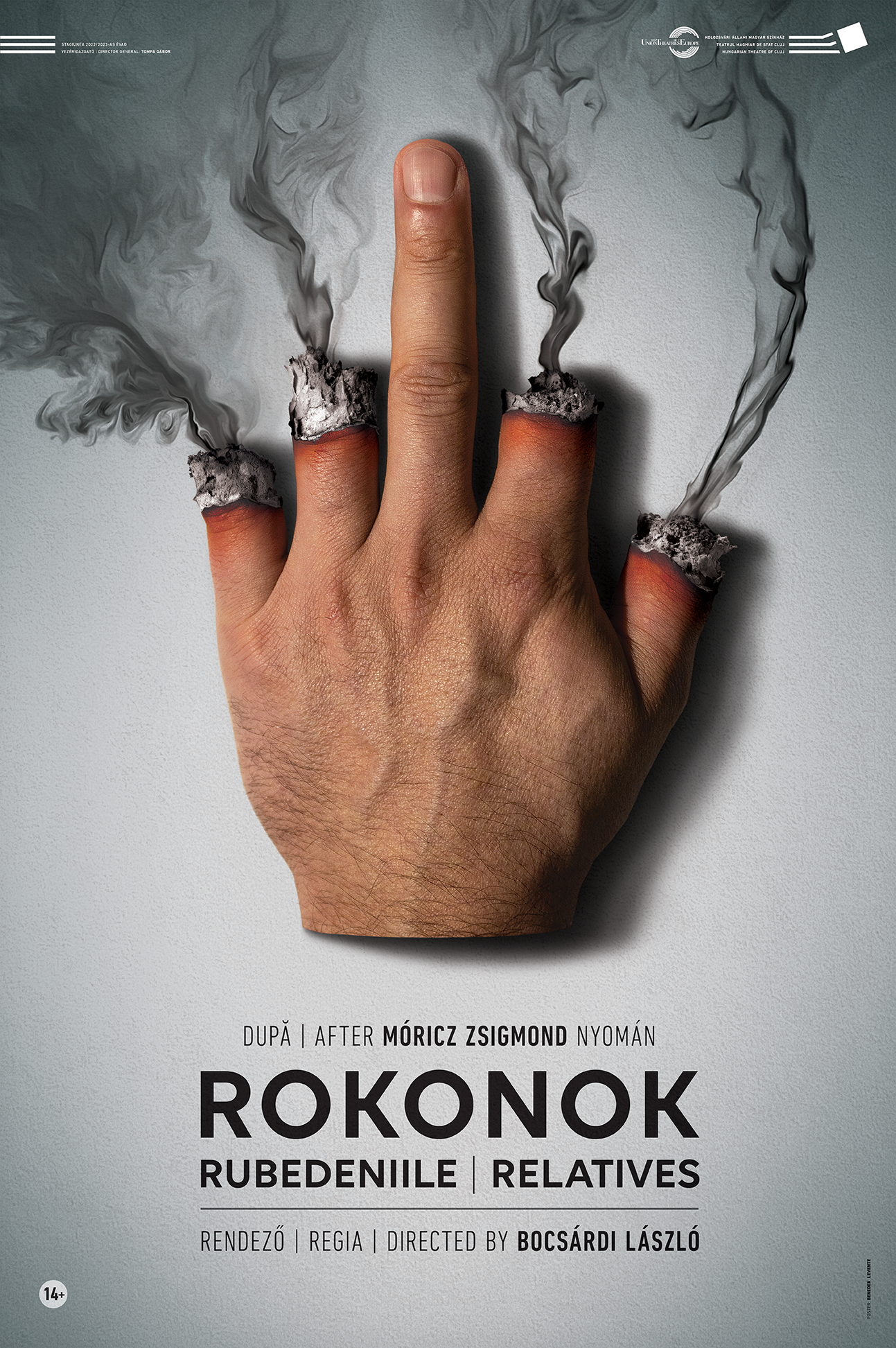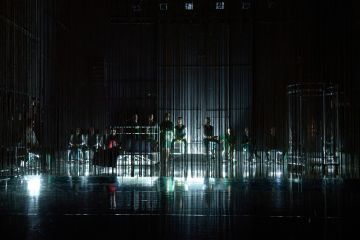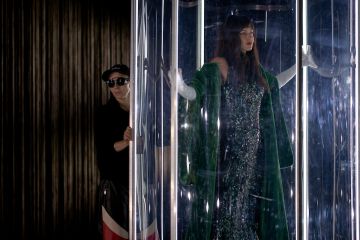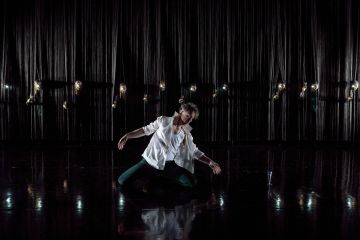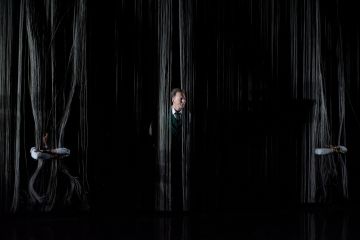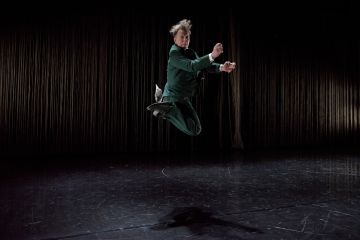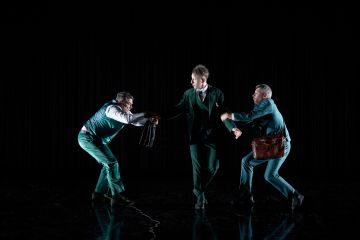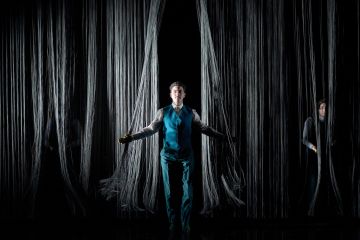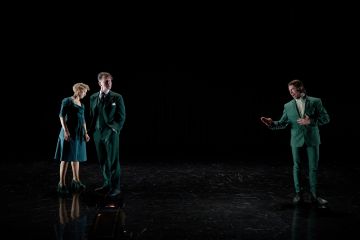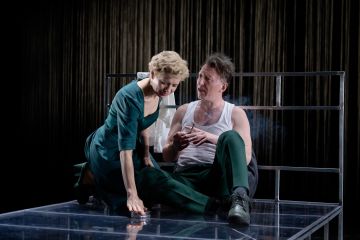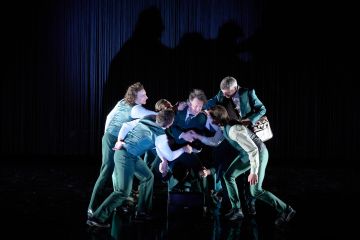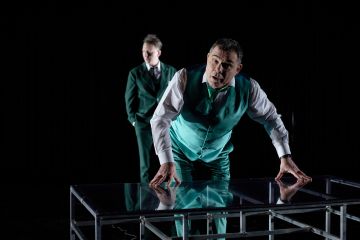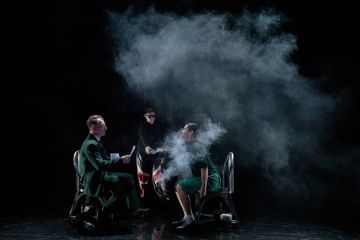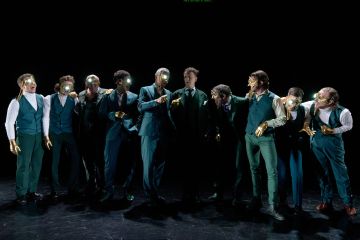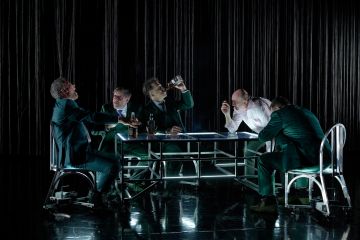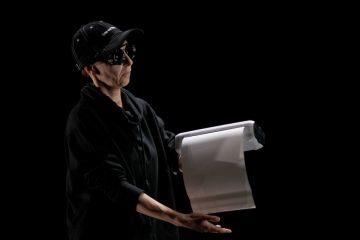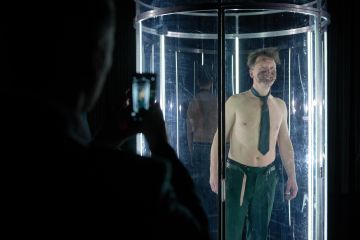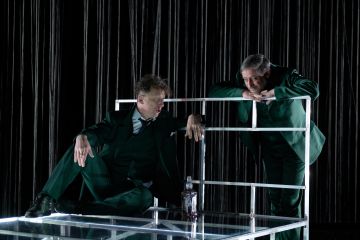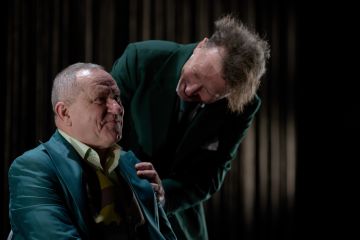Móricz Zsigmond's realistic, crudely critical social background to the issues raised in his novel is poured out in dreamlike waves on the stage of the studio. They are wave-like sequences unfolding unconventionally, deliriously, in front of a huge fringed curtain, concealing the arsenal of mysterious preparations of the mise-en-scène. The set of furnishings is more suspected and glimpsed rather than shown. The set belongs to artist Bartha József and the excessively green costumes were designed by Kiss Zsuzsanna. Given the adaptation of the novel to the economy of dialogue in the performance, in addition to the director, the role of the playwright, Kali Ágnes, is essential.
(…)
Poor Pista, played with great dedication and scenic transformation by Viola Gabor, is caught in this evil web, like threads torn from the giant curtain of inter-family relationships, which are fatally damaging. The appearance of the actress Györgyjakab Enikő as Lina, Pista's wife, is pleasant and welcome. Bács Miklós vigorously underlines the portrait of a grotesque mayor, while the entourage, friends, relatives, financiers, citizens of the town, colored in unifying green, threaten the peace of the prosecutor, hastening his end. Alone or as a group, they act corrosively upon the spirit of the protagonist, who has become intoxicated by the idea of getting rich quickly.
Adrian Țion: Între realism critic și onirism lejer - Rokonok / Rubedeniile [Between critical realism and light onirism - Rokonok / Rubedeniile], liternet.ro, February 2023
A performance that takes into account all the elements of naturalism; the staging is on the edge of that realism so troublesome and intensely cultivated in the middle of the last century in Romania. It's a parodic key that the director puts at our fingertips and with which we can decipher the less obvious meanings of the show. But Rubedeniile remains, before anything else, a direct reference to reflection: we are just as corruptible as we were two or three hundred years ago, temptations make us weaker and dehumanization wreaks just as much havoc as before. A show you don't come out of untouched - simply shrugging your shoulders - but one you come out of pondering: we are so human in our imperfection that falling into the deepest pit of despair is shockingly natural. I'd revisit Rubedeniile if only because the cast is so well thought out that it raises the bar on the text itself.
Nona Rapotan: Despre rudele pe care nu le vrei niciodată la cină, dar cu care împarți și ultimul sfanț [On the relatives you never want for dinner, but with whom you share your last penny ], bookhub.co.uk, 7 February 2023
The many subtle nuances and details of the clear and subtle direction, as well as the sumptuous visuals and choreography, are to be praised. László Bocsárdi confidently chose the actors of the Hungarian Theatre of Cluj for the key roles, and their combined performances leave the audience with the impression that a blend of irony, playfulness, authenticity and depth is created on stage. Gábor Viola (Kopjáss) and Enikő Györgyjakab (Lina), in the main roles, are dazzlingly versatile, and Miklós Bács, as the mayor and the mayor's secretary, is a delight. The performance of József Bíró as Uncle Berci is also powerful, witty and pithy, while Áron Dimény is equally confident and energetic as the wily bank manager. The performances of Loránd Farkas and Attila Orbán are also brilliant: both play two or three characters in a nuanced and elaborate way.
Judit Kiss: Arcok és álarcok uram-bátyámék körhintáján [Faces and masks on the carousel of my uncles], Krónika, February 06, 2023
It is no coincidence that László Bocsárdi turned to Móricz's text, because what the master of Hungarian realist prose wrote about the great-uncle-brothers of Hungary between the two world wars is also completely relevant to our everyday life, which is full of counties, county government commissioners and national colors. The play does not depict the gentry world of the past, but our everyday life, riddled with corruption and intertwined with vested interests, where even the purest of intentions are rejected or strangled.
Emese Vig - Erika Zsizsmann: Összetartozunk? Beleszédülünk a korrupcióba Bocsárdi Rokonok-adaptációjában [Do we belong together? We get caught up in corruption in Bocsárdi's adaptation of Rokonok], Transtelex
The staging of Relatives is so topical that the turns of phrase typical of Móricz and his time are not even noticeable, and the timeless set (the work of József Bartha) and costumes (designed by Zsuzsanna Cs. Kiss) help to make the story feel utterly modern, while there are no exaggerated updates, (allusions) or references to the present. It is as much of the present as it is of the 20th century, as the powerful men at the mercy of each other are always clinging together in the web of perceived power. It is also typically Hungarian, and not only Hungarian: it is topical for every nation, country and society that has plunged into a post-communist, economic and simultaneously moral crisis. Small and large, national and urban alike.
Márta Bodó: Vélt hatalmuk hálójában vergődő egymásnak kiszolgáltatott hatalmasok [The powerful, at each other's mercy, caught in the web of their perceived power], Szabadság, February 27, 2023.
The performance of Relatives, an adaptation of Móricz Zsigmond's novel by László Bocsárdi and Ágnes Kali, directed by László Bocsárdi, at the Hungarian Theatre of Cluj, discusses, in a very pertinent and artistically articulate way, that perennial problem of human nature indulging in social temptations. The characters become representatives of all kinds of faults, archetypes of arrivism in a realist key, sycophants of different species, who seduce and manipulate, climbing up a social ladder that parallels that of moral values. Pista (Gábor Viola), the good man with honourable intentions, once established in a position of power, is willingly persuaded or lured away by an entire fauna ready to be tainted by the rot of corruption and folds into the reality of a continuum of interdependencies of a manipulative system that has been in place since time immemorial. This drunkenness of an individual "betterment" at the expense of the general wellfare of people is elegantly translated into a suite framed by a functional minimalist aesthetic.
[...]
Relatives is a fable that can revive dulled consciences. The mirror of the theatre, this time, is a fringed curtain through which we catch a glimpse of power plays going on behind the scenes. The empathy generated by the performance of the Hungarian Theatre of Cluj needs little explanation. It is recognizable and easy to identify who each of us is, caught between the cogs of a rotten system.
Alina Epîngeac: Seducția subtilă a corupției, predită de domnul profesor compromis [The subtle seduction of corruption, taught by Mr. Compromised Professor], Teatrul Azi 2023/3-4
Kopjáss Pista's drama, around which all the events in the novel revolve, introduces us to the life of a small provincial town, Zsarátnok, and the retinue of types representative of the rising Hungarian bourgeoisie: The mayor (Bács Miklós - in a double role, also that of the mayor's secretary, moves from one character to another with the ease of one who changes only his coat), Kardics, the bank owner (Dimény Áron manages to capture the characteristics of the slippery influential, blackmailer character perfectly), Martiny, the opposition representative (Farkas Loránd gives the person he embodies overflowing energy but also a nastiness that lurks, ready to show its fangs), all involved in small or big provincial shenanigans. Pista, initially a cultural adviser to the town hall, now winner of the election for jurisconsult is seen as a saviour, as a "new broom" in the institution. But it is only an appearance, because his "landing" in the middle of the deeply corrupt world, anointed with all the allusions, will not solve the crisis that society is going through.
[...]
Móricz Zsigmond said of his own creation: 'In my novel I established the thesis that in every family there is a man, the rest are relatives. This would mean that there is one talented and strong individual on whom many helpless people rely. And it also means that the strong one cannot produce anything, because leeches surround him and drag him down into the shallows." Bocsárdi László has managed to bring to light, in moving scenic images these words, relying on the exceptional team he worked with.
Eugenia Sarvari: Rubedenii la Teatrul Maghiar de Stat din Cluj [Relatives at the Hungarian Theatre of Cluj], Vatra 3-4 2023 Târgu Mureș
Can Pista live with power? He's now a prosecutor, he's somebody, but will he manage to be fair between flattery and interests? Insidious phrases about shady dealings are whispered to him. The thicket of power conceives a gradual corruption for homo novus. If it's change... let it begin with a new broom. Manipulation of the press, visible corrections, partying with high society (ridiculous, satirized groups), slogans, election speeches - here is a blatant, acute timeliness. The big secret: "to reconcile the two sides of the fence", to get people to "gladly pay their taxes", but you have to "have some wealth to make people trust you". In the meantime, the sliding multiplies (a wonderful device of the director), the grotesque shows its dreamlike shadows. Miklós Bács is excellent in a dual role (mayor and secretary), grotesque, histrionic, with chameleonic gestures and varied inflections. Viola Gábor (Pista) builds his role with distinctive range, riding subversive waves. Györgyjakab Enikő (Lina) captivates audiences through epic and choreographic effusions full of credibility.
Alexandru Jurcan: Perdele efemere ca nisipul mișcător [Ephemeral curtains as quicksand], Tribuna, No. 492, 1-15 March 2023
Environment? Relationships? Kinship... And the individual alone, lost somewhere in this context. The director of the Hungarian State Theatre of Cluj's production of Relatives - László Bocsárdi, the director of the festival himself - is also trying to reflect on the personality-distorting, neutralizing effect that the pressure of our immediate environment can have on us. The stage adaptation beautifully unravels the rise to status of the common man, his struggle for change. The ever-changing curiosity of his work environment and the insidiousness of its blood-sniffing, sneaky, attacking at any moment type of atmosphere. The relatives' readiness to ask for help. And the image of marriage versus platonic love. Instead of holding power, it is as if our protagonist were shrinking, unable to assert his own will, because there is always a higher power, a benevolent advisor, who tells him, or only politely advises him, on how he should live and make his decisions moving forward. A feeling of guilt also settles in his heart, because he cannot bear the thought of not helping his precious relatives, especially now, when he has the opportunity to do so. The gesture-based language and precise choreography are what define the performance, which indulges the viewer with beautiful images and moments. What is also important from a conceptual and textual point of view is that there is an intention in every movement, whether sudden or slow. The intention that we need something. But instead of a message and a quest for truth, what we get is a story presented as fact, with a specific representation of death at the end. And perhaps everything will once again begin anew...
Patrícia Dimény:Identitás, kapcsolat, reflex [Identity, Relationship], Reflex, Helikon, 2023
Date of the opening: february 05, 2023
Mockery inflicts wounds. Regardless of whether we are mocked or whether we mock ourselves. What does it mean to get a promotion? Are we promoted because of our merits, or because we are useful to someone, somewhere? When we are promoted, we often fall. The fall inflicts a wound. Some people stay on their feet. We envy them. Mockery is often envy. When we are mocked, we react. We get confused and fall.
Panama. How much easier it is to tear down a country than to build it up. Endre Ady, writing about a country in 1899, says that " in the future map of that country there will be a white spot in its place, with the inscription: it was a country, but it was embezzled. "
How many embezzled human lives are there in an embezzled country? What can we do with our embezzled lives?
What happens to a person who suddenly wakes up and realises that what they dream of is possible? What happens to a person who is led to believe that great things are waiting for them? What happens to a small person whose dreams become embezzled? What happens to us when our faith can be embezzled for money and recognition?
Many periods of transitions for a single lifetime. Ideologies change, the how, the definitions. The language of power shifts with it. There was a time when, after revolutions, intellectuals used to think that they were the ones writing the language of power. There are times when the intelligentsia does not speak any language.
The language of money is no longer a question of power. Money speaks to everyone and goes to only a few.
We want greatness, if only we could try to figure something out about the acts of flying and falling.
Ágnes Kali, dramaturg of the performance
"Since the present time
turns into an ugly memory.
And winks me in the eye
this forgettable.
This is forgettable.
This is forgettable."
Tamás Cseh












